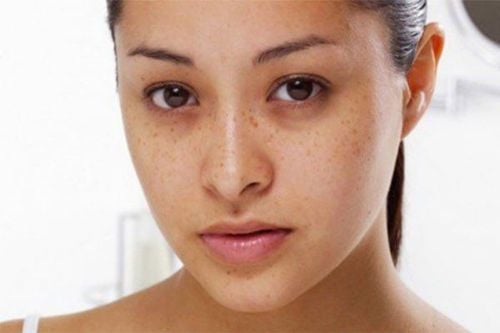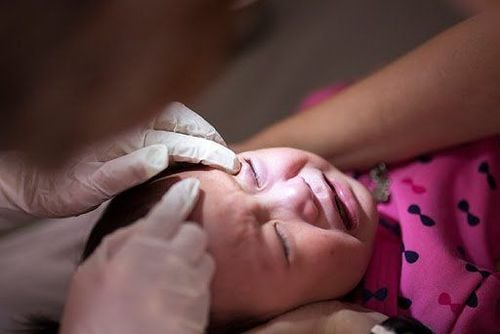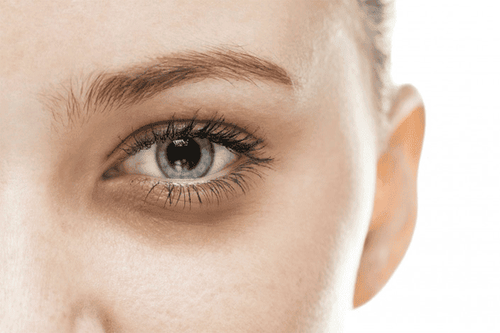1. Are dark circles under the eyes in children abnormal?
According to experts, the skin under the eyes is thinner than the rest of the face. Some people with darker skin tones, including those of Middle Eastern or Mediterranean descent, have darker pigmentation, which can cause under-eye circles to appear. A tired baby will also often rub their eyes, causing the sensitive skin under the eyes to become red.
Many parents blame allergies for causing dark circles, but according to experts, seasonal allergies usually do not appear in children under 1 year old. Infants usually need to be exposed to environmental allergens for one or two seasons before developing hay fever.
If your child has fair skin, the skin around their eyes may be even more translucent than other babies. This can make the dark circles under their eyes more apparent.
Sometimes, dark circles under the eyes can be caused by genetics or hyperpigmentation in the skin. This is called periorbital hyperpigmentation and is more common in infants with darker skin. If you have dark circles around your eyes, it is very likely that your child will too.

Children with allergic rhinitis may develop allergic shiners, which are dark circles under the eyes caused by swelling of the blood vessels beneath the skin. Sometimes, dark circles around the eyes can be caused by other issues. For example, allergies, such as rhinitis, can cause dark circles. Viral or bacterial infections in the sinuses (sinusitis) can also cause your child to have dark circles and swelling under the eyes.
These conditions will cause other symptoms, such as sneezing accompanied by rhinitis, nasal congestion, or a constant runny nose due to sinusitis. The skin around the baby's eyes may also appear swollen and feel soft when you touch it. If you are concerned or think your child may have a sinus infection, talk to your pediatrician soon.
Some particularly sensitive breastfed babies may have allergic reactions to foods in their mother's diet, but this usually appears as hives or blood in the stool rather than dark circles under the eyes.
Although very rare, dark circles around the eyes can be caused by tumors. If the skin under your baby's eyes is very dark, take your child to a pediatrician for screening.

2. Treating Dark Circles Under the Eyes in Children
Dark circles may not require treatment as they may lessen when the underlying cause is addressed. Here are some preventive measures you can take to prevent dark circles:
- If nasal congestion is due to allergies, identify the cause and ensure your child avoids the triggers.
- Consult a doctor and adhere to the treatment plan if your child is diagnosed with a sinus infection or asthma.
- Treat allergic rhinitis.
- Do not apply skin lotions or lightening creams as they can damage your child's delicate skin.
- Ensure that your child gets good sleep and nutrient-rich food.
Although the appearance of dark circles under the eyes itself is not a serious symptom, parents should take their children to the doctor to rule out causes that could indicate a serious illness. After the cause of the dark circles is diagnosed, it is important that you follow the treatment plan that you and the doctor have prescribed for your child to reduce the risk of potential complications, including:
- Anaphylactic shock (a life-threatening allergic reaction)
- Developmental delays and failure to thrive
- Hearing loss
- Spread of infection
- Vision loss

The treatment for dark circles under the eyes depends heavily on the underlying cause. There are many treatment options for nasal congestion, ranging from avoiding any known allergy triggers to over-the-counter decongestants and antihistamines. Sometimes, treatment is not necessary. If nutritional deficiencies are causing the dark circles under the child's eyes, then supplements may be a solution. However, it is not safe to give children iron supplements without consulting a pediatrician. A blood test can diagnose deficiencies in certain nutrients. In non-emergency cases, dietary changes are preferred over supplements.
To arrange an appointment, please call HOTLINE or make your reservation directly HERE. You may also download the MyVinmec app to schedule appointments faster and manage your reservations more conveniently.
References: babycenter.com, healthgrades.com
SEE MORE
Common types of myopia and how to treat Vision impairment: What you need to know How to detect a baby's vision problems?









